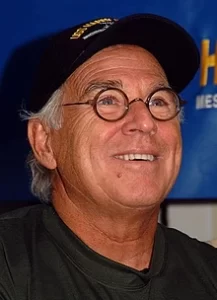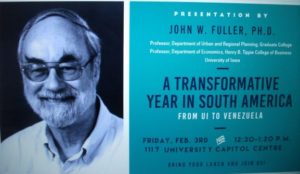
Poster for a presentation at which John Fuller discussed his experiences at La Universidad de los Andes in Venezuela in the 1980s.
Starting this summer, John Fuller will find something new to do with his time. He is retiring after 41 years on the faculty of the University of Iowa, where he has been a professor in the School of Urban and Regional Planning (SURP) since 1979. But he has been much more. He had cross-postings in the Departments of Economics and Geography. He was the resident expert on transportation planning. At times, he chaired the planning school, and from 1979-1995, he was executive director of the Legislative Extended Assistance Group (LEAG) of the Iowa Legislature, which initiated policy research on issues of legislative importance. He also directed the Institute of Urban and Regional Research from 1979-1983. That is where I began working for him.
I have known John for nearly half his life. When I entered the planning program at Iowa in January 1982, he immediately hired me as a graduate research assistant, probably recognizing talents I did not yet know I had, and trusting that high GRE scores portended success. By the time I left in the spring of 1985, just before marrying my wife in Omaha that June, I had completed one of those LEAG studies, possibly one of its most consequential ones, The Farm Credit Crisis in Iowa, examining a financial meltdown in the farm sector and its consequences to communities in rural Iowa. John was aware that I already was undertaking a Master’s Project in Journalism on the subject, which I would ultimately turn into a published book (Raising Less Corn and More Hell, University of Illinois Press, 1988), and convinced legislative leaders to engage me on a policy study. It was a highly formative experience that allowed me to exhibit writing skills that became a cornerstone of my career as it evolved.
John was big on creating opportunities like that for people in whom he had confidence. I am proud to this day that he had such confidence in me. I know that other such expressions of confidence made a similar difference for many others over the decades that followed.
John had already had a meaningful career before he ever arrived at the University of Iowa. He completed a bachelor’s degree in economics at San Diego State University in 1962. He went on to earn a Ph.D. at Washington State University before undertaking a winding path through the Wisconsin Department of Transportation, initially as chief of economic analysis, until he was secretary of the Wisconsin Highway Commission in 1976-1977, just before becoming deputy executive director of the National Transportation Policy Study Commission during the Carter administration in Washington. From there, he moved to Iowa City, where he has remained. He has, however, become a long-time fixture at the federal Transportation Research Board, where he has served on many committees and in many capacities. Often, if I came to Iowa City and John was not there, it was because he was at a TRB meeting in Washington, D.C.
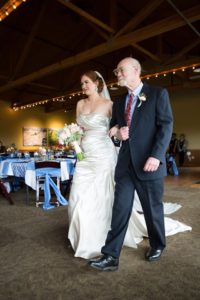
John escorts youngest daughter Elizabeth (Libby) in 2016 wedding.
By the time I met him, John was married to Kathy Fait. They have four children who are today scattered across the landscape in places like California, Houston, and Ann Arbor, Michigan. Retirement may afford them both the chance to visit children and grandchildren more often than they already do. That will surely be appreciated. Meanwhile, they can enjoy their large home on a hill in West Branch, whose primary claim to fame is that it serves as the home of the Herbert Hoover Presidential Library and Museum, just a short bicycle ride away. Not surprisingly, John is the chair of the West Branch Planning & Zoning Commission.
At the University of Iowa, he found his lasting home, but he may also have found himself. In fact, he and Kathy may have carved out a joint mission that made them unique. Increasingly over time, John found ways to connect with students, and Kathy assisted by making their home a place where foreign students particularly felt welcome. Charles (Chuck) Connerly, who became the SURP director in 2008, states:
John spent his career dedicating himself–through his teaching and his kindness–to his students. In the classroom, John was always staying abreast of the latest trends and issues in transportation so that his students were always well aware of the key issues in this important field. He dedicated his career to transportation, and his students greatly benefited from his commitment.
John was also committed to the welfare of our students in planning, especially our foreign students. As a Fulbright scholar himself, John worked very hard to bring Fulbright students to our planning program. Every year there would be at least one Fulbright scholar and often two or three. These scholars, from all over the world, contributed greatly to the quality of our student body and to the overall quality of the educational experience for all our students.
But John, along with his wife Kathy Fait, also made sure that foreign students felt welcomed at Iowa. They would pick students up at the airport, help them negotiate the first few days of their time in Iowa City, and would provide them with stuff that these students, often from warmer climates, would need–such as winter coats and luggage. As an advisor and Director of Graduate Studies, John worked hard to make certain that each of our foreign students was able to complete their studies here, even when some of these students got off to a rocky start. Because of this good care, Fulbright has always looked to us as a good program and university at which scholars can be placed.
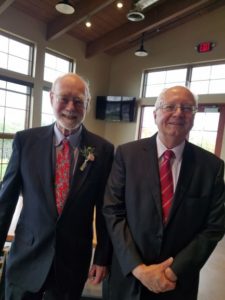
John Fuller with me at his daughter’s wedding.
I can attest to much of what Chuck says. He arrived amid the infamous 2008 floods that forced the evacuation of more than 10 percent of nearby Cedar Rapids and wrought damage to the Iowa City campus totaling hundreds of millions of dollars. The school contemplated how it could play a bigger role in assisting Iowa communities with hazard-related problems and considered adding material to its Master’s degree curriculum. Long after most professors would have lost touch with their students, John was very much aware of my work on the subject for the American Planning Association. “Why not bring back Jim Schwab?” he asked, and urged hiring me to teach such a course. I hurriedly designed the course that summer for the fall semester. I have been teaching variations of it ever since.
Of course, I needed to drive out from Chicago to do so. John and Kathy offered their home as a place to stay while I was in town, usually the spare bedroom in the basement. Often, in breakfast conversations, I learned from Kathy of the latest delegation of foreign visitors they had been entertaining. I also learned during that first fall course of a flood refugee named Fred from nearby Coralville, to whom they provided emergency housing for several weeks. The door seemed always open if they could find a way to help.
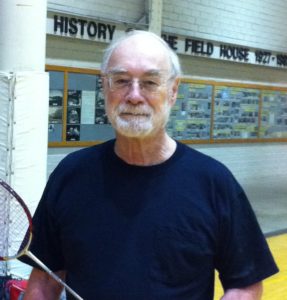
Badminton, anyone? John found ways to stay fit, including playing in a badminton club.
The Fullers also have an abundant garden in their ample backyard, and I am sure I was not the only one who sometimes drove away after a visit with bags of apples and vegetables they had deliberately picked for me in order to share their cornucopia. It is just part of who they are.
As a result, even classmates of mine, like Kirk Bishop, now a planning consultant in Chicago with Duncan & Associates, who never took a class with Fuller, can say, “I remember him well. Even in our occasional passing in the hallways he was always quick with a smile, a nod, or a hello. A good soul. Fond memories indeed.” It is a rare occurrence when someone can distinctly remember, more than 35 years later, a professor who never taught them. It is a level of personal impact that is exceedingly hard to achieve.
In ordinary times, under ordinary circumstances, a long and distinguished career would likely be celebrated with a farewell gathering of students and faculty and staff, perhaps in a restaurant or some party setting, perhaps at some university facility adequate for the purpose. People would mingle, share stories, and salute the honoree with best wishes for a healthy, happy retirement. Unfortunately, these are not normal times, and no such gathering would have been safe or appropriate.
Chuck Connerly and others did the next best thing, at least for the time being: They hosted an online happy hour via Zoom, which I mentioned in my last blog post. That too was unfortunate, because, while I am told that at least 40 colleagues and SURP alumni joined the discussion, I was not only unable to do so because of my sudden hospitalization, but unable as well to even tell anyone why I was not there. I still regret that, even though I could do nothing about it.
But we are assured that, when the day comes that such a gathering can be done safely, the School will honor John with an in-person gathering for those able to attend. When that day comes, I will drive four hours to Iowa City to attend. After all these years, and all the kindnesses he and Kathy extended, it will be the least I can do. It is especially important to recognize when someone has turned a career into a mission to serve.
Jim Schwab

